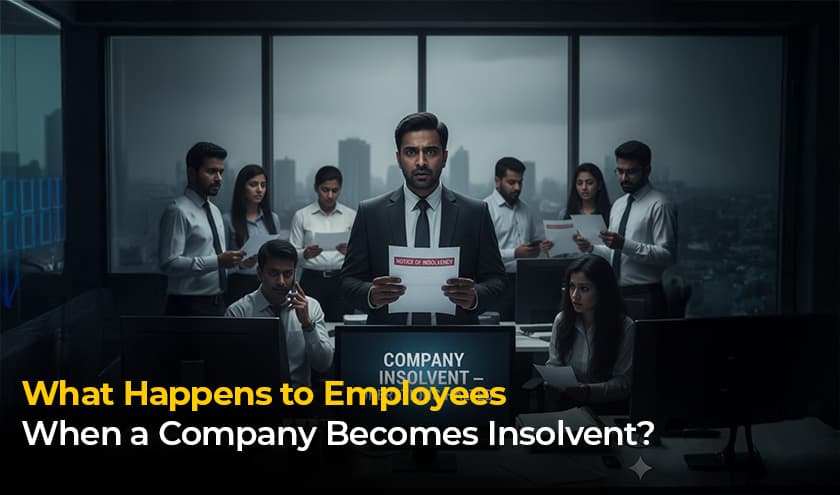What Happens to Employees When a Company Becomes Insolvent?

Understanding Employee Rights When a Company Becomes Insolvent
Walking into work to discover that your company has declared bankruptcy can be stressful. Many employees are left uncertain about unpaid salaries, benefits, and job security. In India, over 4,500 companies underwent insolvency proceedings last year, highlighting the relevance of understanding employee protections. This article explains what employees of a bankrupt company need to know, how insolvency impacts staff, and the steps to safeguard your rights with guidance from NCLT lawyers.
What Is Company Insolvency in India?
Definition of Insolvency
- A company becomes insolvent when it is unable to pay its financial obligations to creditors.
- Insolvency proceedings in India are governed primarily by the Insolvency and Bankruptcy Code (IBC), 2016.
Employee Protections Under the IBC
- Employees are classified as operational creditors, giving them priority in claims.
- Outstanding wages for up to 24 months prior to insolvency are included in the resolution plan.
- The National Company Law Tribunal (NCLT) oversees the process, ensuring employee claims are addressed.
Role of NCLT Lawyers
- Assist in filing employee claims and negotiating settlements.
- Ensure legal documentation is complete to protect employee rights.
Common Issues Faced by Employees During Insolvency
Salary and Pending Payments
- Wages, bonuses, and leave encashments can become uncertain.
- Filing claims with the resolution professional ensures payment is considered in the settlement.
Risk of Retrenchment or Redundancy
- Insolvency may lead to layoffs or company closure.
- Employees are entitled to severance under labor laws, which are recognized in IBC proceedings.
Misconceptions About Employee Rights
- Myth: Employees lose all claims in bankruptcy.
- Reality: Operational creditors, including employees, have higher priority than unsecured creditors.
Emotional and Legal Stress
- Anxiety due to uncertainty is common.
- Early legal intervention by NCLT lawyers in Delhiand across India mitigates risks.
Practical Steps for Employees of a Bankrupt Company
- Verify Your Employment Records
- Ensure pay slips, contracts, and leave balances are accurate.
- File a Claim with the Resolution Professional
- Submit formal claims for unpaid wages, benefits, and gratuity.
- Engage an Experienced NCLT Lawyer
- Helps with claim documentation, hearings, and negotiations.
- Understand Your Legal Rights
- Salary dues for the past 24 months
- Provident Fund contributions
- Gratuity and severance payments
- Explore Alternative Remedies
- If claims remain unpaid, employees can approach labor courts or the NCLT.
Case Studies: How Employee Rights Are Protected
Case 1: Mid-Sized IT Company in Delhi
- Employees had 6 months of pending salary.
- NCLT approved a resolution plan prioritizing employee wages, guided by legal counsel.
Case 2: Manufacturing Firm in Mumbai
- Mass layoffs due to insolvency.
- Employees received full severance and gratuity payments as operational creditors.
Key Takeaways
- Timely legal action is critical.
- Accurate employment records prevent disputes.
- NCLT resolutions often favor properly filed employee claims.
Best Practices for Employees and Employers
For Employees:
- Maintain detailed salary and employment records.
- File claims promptly with the resolution professional.
- Consult experienced NCLT lawyersin India for guidance.
For Employers:
- Maintain transparency in financial reporting.
- Communicate openly with employees during insolvency.
- Ensure statutory employee payments to avoid NCLT disputes.
Protect Your Rights with VakeelSaab’s Legal Expertise
If your employer has declared insolvency, professional guidance can safeguard your salary, benefits, and legal entitlements. VakeelSaab’s NCLT lawyers in Delhiand across Indiaassist employees in filing claims, negotiating settlements, and navigating complex insolvency proceedings. Contact VakeelSaab today to secure your rights and take the first step toward financial protection.
Frequently Asked Questions (FAQ)
Q1: Are employees guaranteed payment if a company goes bankrupt?
- Employees are prioritized as operational creditors, but timely claims are essential.
Q2: How long does it take to receive dues after insolvency filing?
- Resolution can take several months; legal guidance can speed up the process.
Q3: Can employees challenge unfair settlement plans?
- Yes, through the NCLT or labor courts, with professional legal representation.
Q4: Do unpaid salaries count toward provident fund and gratuity?
- Only payable wages are considered; legal advice clarifies individual entitlements.
Q5: Should I approach an NCLT lawyer immediately?
- Early consultation ensures complete documentation and proper filing of claims.
Related Articles
The Importance of Consulting a Property Lawyer for Real Estate Issues
Blog
How to File a POCSO Complaint in India: Step-by-Step Legal Process
Blog
What punishments does the law give for giving, taking, or asking for dowry?
Blog
Reasons for the Increasing Divorce Rates in India
Blog
What is a Special Leave Petition? Meaning, Features, Process & & Who Can File?
Blog
What Is the Difference Between Mutual Divorce and Contested Divorce?
Blog